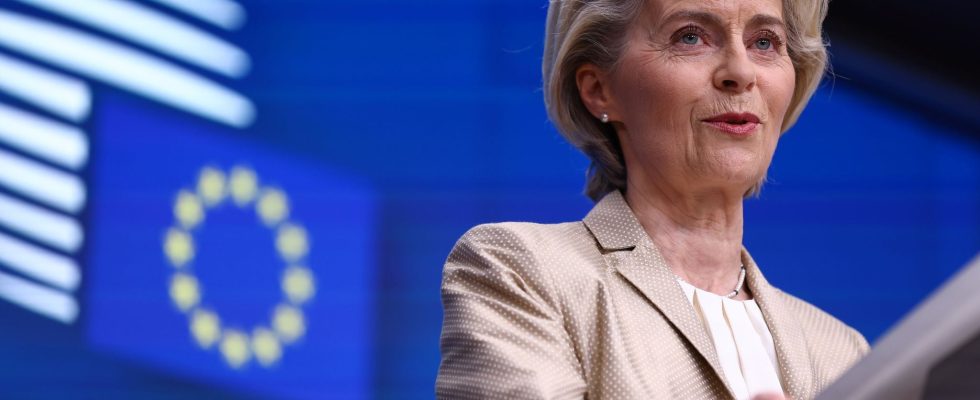The question is crucial. Should the European Union keep the same pace in terms of environmental policy, at the risk of running out of steam? Committed to achieving carbon neutrality in 2050, Member States must already reduce their greenhouse gas emissions by 55% by 2030. The aim now is to set the intermediate course, by 2040. In June last, the Scientific Advisory Council on Climate, a body created by the EU on the same model as the High Council for the Climate in France, recommended a reduction “of 90 to 95%” of EU CO2 emissions.
The conditions to be met are numerous: almost zero CO2 electricity production, a reduction of almost half in oil imports, better energy efficiency, even a limitation on the number of livestock. “When we dissect the objective, it comes down to maintaining the pace of efforts over time”, deciphers Pascal Canfin, the president (Renew) of the Environment committee in the European Parliament.
Political tension
Will this even be possible? For the moment, the 27 are lagging behind. The Commission led by Ursula Von der Leyer launched into the Green Deal, a vast plan which saw the birth of important regulations such as the end of sales of thermal vehicles in 2035, the transformation of the industry, or the implementation place of a carbon border adjustment mechanism… The success of this objective will therefore depend on the variations of this plan by the States. But according to a Commission publication in mid-December, the measures already taken by States should only allow a 51% reduction in their emissions by 2030, or 5 points less than the initial objective. . “The ability to achieve the objectives in 2040 will be conditional on those of 2030, and for the moment we must bring ourselves into compliance with these,” notes Nicolas Berghmans, energy-climate expert on Europe at the Development Institute Sustainable Development and International Relations (IDDRI).
This upgrade will be all the more necessary as over the next decade, many key texts will need to be revised. “We will have to renovate part of the real estate stock, change the regulations to make way for a more circular economy, or review the carbon market,” underlines Camille Defard, head of the energy center at the Jacques Delors Institute. But already, weariness looms. In recent months, several political leaders have shown themselves reluctant to increase the number of these new taxes or standards. Last May, Emmanuel Macron surprised, even calling for a “European regulatory break”, in the name of competitiveness.
More than the ambition of the institutions, it is therefore the political tension which has built up in recent months which threatens. In the home stretch of her mandate, Ursula Von der Leyen saw the final provisions of her Green Deal rejected by the right. The agricultural part of his plan, the vast “Farm to fork” file (from the farm to the plate in good French), is no longer moving forward. At the end of November the regulation on reducing the use of pesticides was rejected in Parliament, and the evolution of legislation on packaging was largely rewritten by MEPs. In the maneuver, in particular, the European extreme right but also the center-right European People’s Party (EPP), which has worked to defend farmers who are very opposed to these reforms.
Crucial European elections
Has the European Union moved too quickly on environmental reforms? “It has become a subject of political division. Some are calling for this transition to be made fairly quickly and others believe that it must be slowed down, because the actors on the ground are unable to keep up. Many questions relate to the way of doing things within each sector”, notes Nicolas Berghmans.
The European Commission will reveal its results on the chosen trajectory on February 6. It should unsurprisingly follow the recommendations of the Scientific Council and set the objective of a 90% reduction by 2040. But the success of the decarbonization trajectory will be mainly determined by the European elections in June. The latest polls suggested a Parliament more marked to the right. “These elections are crucial for the continuation of the Green Deal, depending on the composition of Parliament we will give ourselves the means or not to achieve these objectives,” adds Camille Defard.
To overcome the pro- and anti-ecology divisions, political leaders will have to convince European citizens of the benefits of this transition. “We will have to succeed in establishing an alternative narrative for the future Green Deal in order to reconnect with trust, because we very clearly perceive a concern regarding the lack of support for this transition,” assures the specialist from the Jacques Delors Institute. “We have to walk on two legs, climate ambition on one side and, on the other, ensure that our companies remain competitive and that the transition is fair,” Wopke Hoekstra, the commissioner, recognized this Monday. responsible for Climate. The leaders of the list who are calling for it will therefore have to convince European citizens not only of the advantages of this transition, but also of its pace. A challenge, as it will be necessary to find pedagogy on this technical subject.
.
